中国古典诗词英文翻译之清明【唐】杜牧
杜牧《清明》的全诗翻译及赏析
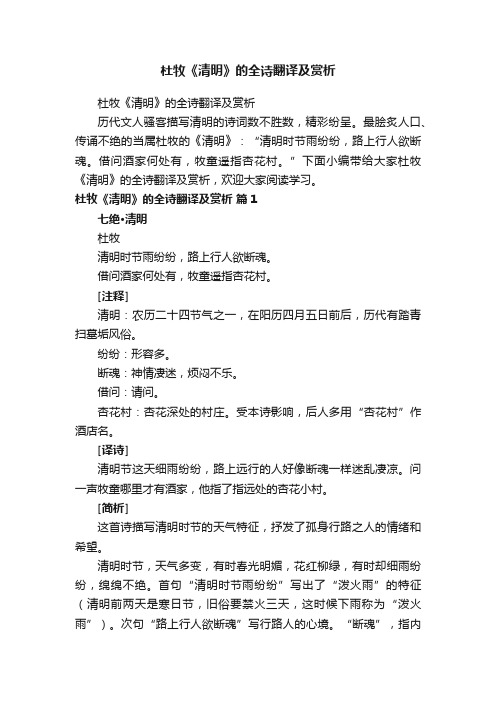
杜牧《清明》的全诗翻译及赏析杜牧《清明》的全诗翻译及赏析历代文人骚客描写清明的诗词数不胜数,精彩纷呈。
最脍炙人口、传诵不绝的当属杜牧的《清明》:“清明时节雨纷纷,路上行人欲断魂。
借问酒家何处有,牧童遥指杏花村。
”下面小编带给大家杜牧《清明》的全诗翻译及赏析,欢迎大家阅读学习。
杜牧《清明》的全诗翻译及赏析篇1七绝·清明杜牧清明时节雨纷纷,路上行人欲断魂。
借问酒家何处有,牧童遥指杏花村。
[注释]清明:农历二十四节气之一,在阳历四月五日前后,历代有踏青扫墓垢风俗。
纷纷:形容多。
断魂:神情凄迷,烦闷不乐。
借问:请问。
杏花村:杏花深处的村庄。
受本诗影响,后人多用“杏花村”作酒店名。
[译诗]清明节这天细雨纷纷,路上远行的人好像断魂一样迷乱凄凉。
问一声牧童哪里才有酒家,他指了指远处的杏花小村。
[简析]这首诗描写清明时节的天气特征,抒发了孤身行路之人的情绪和希望。
清明时节,天气多变,有时春光明媚,花红柳绿,有时却细雨纷纷,绵绵不绝。
首句“清明时节雨纷纷”写出了“泼火雨”的特征(清明前两天是寒日节,旧俗要禁火三天,这时候下雨称为“泼火雨”)。
次句“路上行人欲断魂”写行路人的心境。
“断魂”,指内心十分凄迷哀伤而并不外露的感情。
这位行人为何“欲断魂”呢?因为清明在我国古代是个大节日,照例该家人团聚,一起上坟祭扫,或踏青游春。
现在这位行人孤身一人,在陌生的地方赶路,心里的滋味已不好受,偏偏又淋了雨,衣衫全被打湿,心境就更加凄迷纷乱了。
如何排遣愁绪呢?行人自然想:最好在附近找个酒家,一来歇歇脚,避避雨;二来饮点酒,解解寒;更主要的可借酒驱散心中的愁绪。
于是他问路了:“借问酒家何处有?”问谁,没有点明。
末句“牧童遥指杏花村”中的“牧童”二字,既是本句的主语,又补充说明上句问的对象。
牧童的回答以行动代替语言,行人顺着他手指的方向望去,只见在一片红杏盛开的树梢,隐隐约约露出了一个酒望子(古代酒店的标帜)。
诗到这里戛然而止,至于行人如何闻讯而喜,兴奋地赶上前去,找到酒店饮上几杯,获得了避雨、解寒、消愁的满足等等,都留待读者去想象。
杜牧《清明》诗英译20种

杜牧《清明》诗英译20种⼜到清明,各⼤英语⽹站纷纷掘出以前的数据,借势再让英语学习者关注。
不过遍览各种帖⼦,发现只有六七种名家英译,且清⼀⾊都是中国⼈翻译的,独独不见外国⼈英译版本,笔者于是探头⼊故纸堆,再借助现代科学技术检索,找出了13种译本及其出处,并对⽹上盛传7种版本的出处做了逐⼀溯源考察以备进⼀步研究,数据⼒求详实准确,欢迎引⽤(需要具体页码可短信联系笔者)。
下⾯作逐⼀罗列:《清明》(唐)杜牧清明时节⾬纷纷,路上⾏⼈欲断魂。
借问酒家何处有?牧童遥指杏花村。
1,托尼·巴恩斯通、周平合译On Purebright Day(Anchor Book of Chinese Poetry,Random House)Purebright Season comes with fine fast drizzleand travelers on the road feel their souls sliced off.Please tell me where I can find a wine shop?A cowherd boy points to distant Apricot Blooming Village.(笔者找到的唯⼀⼀个外国译者译本——确切说是⽬的语译者主动侵⼊、源语译者辅助的⽅式,感觉如何?各种“不美”么,还是我们⽼觉得⾃⼰的才美?中国⽂化⾛出去先⾛⽂化呢还是先⾛美?⽂化⾛出去之后就要⾛美么?这些都是笔者⼀直在⽭盾纠结的问题。
我们的杨宪益许渊冲译本据说——也只是据说——最受外国⼈好评,不过囿于笔者学识浅陋,尚未在⼤⾏于核刊之道的主流论⽂中见到转引转述,是获得了外国汉学家好评呢,还是外国诗歌爱好者的好评呢。
如果有同⾏见到,还请明⽰指教。
)2,丁祖馨、伯顿·拉斐尔合译Qingming Festival(中国诗歌集,辽宁⼤学出版,2003)Qingming Rains never seem to end.The traveller along this road is overcome by dejection."Where can I find a tavern?""Apricot Village, way down the road,"A cow boy replies pointing his finger.(将此译⽂列为第⼆原因在于它是⼀个中英合译本,丁教授在《中国诗歌集》的“致谢”中让美直⾔得到丹佛⼤学伯顿·拉斐尔教授的润⾊,介⼊了英语母语读者——确切说是专家的理解和辅助诠释,使得译本更接近英语读者喜闻乐见的“风格”。
清明节的诗 英文
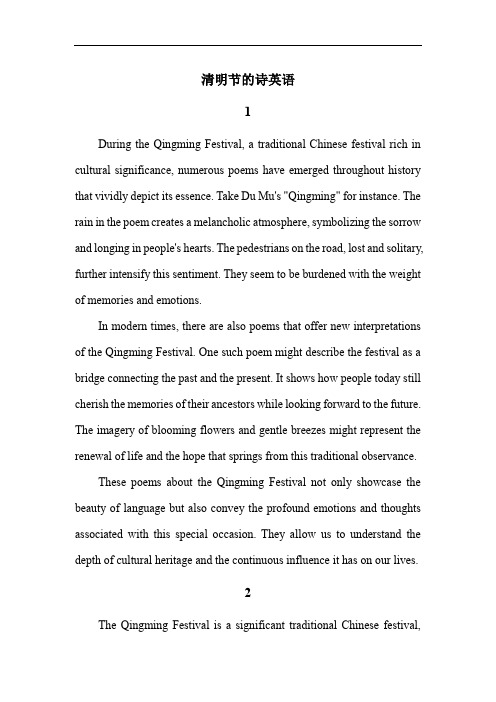
清明节的诗英语1During the Qingming Festival, a traditional Chinese festival rich in cultural significance, numerous poems have emerged throughout history that vividly depict its essence. Take Du Mu's "Qingming" for instance. The rain in the poem creates a melancholic atmosphere, symbolizing the sorrow and longing in people's hearts. The pedestrians on the road, lost and solitary, further intensify this sentiment. They seem to be burdened with the weight of memories and emotions.In modern times, there are also poems that offer new interpretations of the Qingming Festival. One such poem might describe the festival as a bridge connecting the past and the present. It shows how people today still cherish the memories of their ancestors while looking forward to the future. The imagery of blooming flowers and gentle breezes might represent the renewal of life and the hope that springs from this traditional observance.These poems about the Qingming Festival not only showcase the beauty of language but also convey the profound emotions and thoughts associated with this special occasion. They allow us to understand the depth of cultural heritage and the continuous influence it has on our lives.2The Qingming Festival is a significant traditional Chinese festival,and the poetry related to it holds profound cultural connotations and artistic charm. Take the classic poem "Qingming" by Du Mu for instance. "A drizzling rain falls like tears on the Mourning Day; The mourner's heart is going to break on his way. Where can a wineshop be found to drown his sad hours? A cowherd points to a cot 'mid apricot flowers." The rhythm and rhyme of this poem are exquisite. The gentle and melancholic tone reflects the solemn atmosphere of the festival and the people's remembrance of their deceased loved ones. It also showcases the ancient social customs of visiting tombs and expressing grief during this period.Now, let's look at a contemporary Qingming poem. In modern times, poets often incorporate new elements and expressions to convey the meaning of the festival. They might use vivid imagery and modern language to describe the changing emotions and thoughts towards life and death. This innovation not only keeps the essence of the festival but also gives it a new lease of life in the contemporary context.In conclusion, Qingming Festival poetry, whether classic or contemporary, is a window into understanding Chinese culture and human emotions. It allows us to appreciate the beauty of language and the depth of thought, as well as the continuation and evolution of traditions over time.3During the Qingming Festival, a traditional Chinese festival filled with solemnity and reflection, poetry plays a significant role in expressingpeople's deep emotions and thoughts. One touching poem goes like this: "The gentle rain falls on the mourning day, tears blend with raindrops in dismay. Remembering loved ones who have passed away, the heart aches, but memories won't sway." The author's words convey a profound sense of longing for the departed relatives, and the pain of separation is palpable. Through this poem, we can feel the author's heartache and the value they attach to the memories shared with the deceased.Another inspiring poem about Qingming Festival urges people to cherish the present: "In the season of remembrance, let's not dwell in sadness. The lives lost teach us to grasp the gladness. Live each day to the fullest, love with all our might. For time is fleeting, don't waste the precious light." This poem reminds us that while we remember the past, we should also focus on the present and make the most of every moment.The poems of Qingming Festival are not just words on paper; they are vessels of emotions, carrying our love for the departed and our determination to live meaningfully. They make us ponder over the fragility and preciousness of life, and inspire us to cherish every second we have.4The significance of poetry during the Qingming Festival in inheriting traditional culture cannot be overstated. Qingming Festival, a time of reflection and remembrance, finds its essence captured beautifully in the verses composed through the ages.One classic example is the poem "A drizzling rain falls like tears on the Mourning Day; The mourner's heart is going to break on his way." This poem has been widely recited among the people for generations. It vividly portrays the solemn and melancholic atmosphere of the festival, evoking a sense of respect for the ancestors and a reflection on life and death. It educates the later generations on the importance of filial piety and gratitude.In modern times, new Qingming Festival poems have emerged, seamlessly integrating traditional elements with contemporary themes. They not only maintain the essence of the festival but also adapt to the changing social context, making the tradition more accessible and relevant to the current generation.These poems serve as a bridge between the past and the present, allowing us to connect with our roots and carry forward the valuable cultural heritage. They inspire us to cherish the present, remember the past, and look forward to the future with a sense of responsibility and respect for our traditions.5During the Qingming Festival, an important traditional Chinese festival, poetry has played a significant role in expressing people's thoughts and emotions towards life and death. Take the renowned poem "清明时节雨纷纷,路上行人欲断魂" as an example. In this poem, the description of the rainy scene and the sorrowful pedestrians reveal the ancient people'sdeep respect and mourning for the deceased. They believed that death was not the end but a transition to another form of existence, and thus, they commemorated the departed with sincerity and grief.This view of life and death has profound value and influence in contemporary society. It reminds us to cherish the present and value the time spent with our loved ones. It also teaches us to face death with dignity and acceptance, rather than fear and avoidance.In modern times, although our lifestyles and values have changed, the essence of this concept still holds true. We should inherit and carry forward this traditional wisdom, using it to guide our lives and cultivate a more positive and profound attitude towards life and death. Through the exploration of Qingming Festival poetry, we can gain a deeper understanding of Chinese traditional culture and its timeless wisdom.。
用英语介绍中国传统节日——清明节
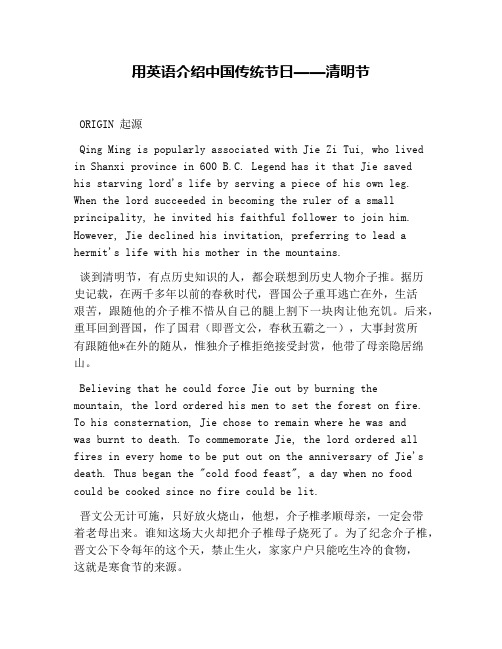
用英语介绍中国传统节日——清明节ORIGIN 起源Qing Ming is popularly associated with Jie Zi Tui, who lived in Shanxi province in 600 B.C. Legend has it that Jie savedhis starving lord's life by serving a piece of his own leg. When the lord succeeded in becoming the ruler of a small principality, he invited his faithful follower to join him. However, Jie declined his invitation, preferring to lead a hermit's life with his mother in the mountains.谈到清明节,有点历史知识的人,都会联想到历史人物介子推。
据历史记载,在两千多年以前的春秋时代,晋国公子重耳逃亡在外,生活艰苦,跟随他的介子椎不惜从自己的腿上割下一块肉让他充饥。
后来,重耳回到晋国,作了国君(即晋文公,春秋五霸之一),大事封赏所有跟随他*在外的随从,惟独介子椎拒绝接受封赏,他带了母亲隐居绵山。
Believing that he could force Jie out by burning the mountain, the lord ordered his men to set the forest on fire. To his consternation, Jie chose to remain where he was andwas burnt to death. To commemorate Jie, the lord ordered all fires in every home to be put out on the anniversary of Jie's death. Thus began the "cold food feast", a day when no food could be cooked since no fire could be lit.晋文公无计可施,只好放火烧山,他想,介子椎孝顺母亲,一定会带着老母出来。
关于清明节英语作文及译文(精选13篇)
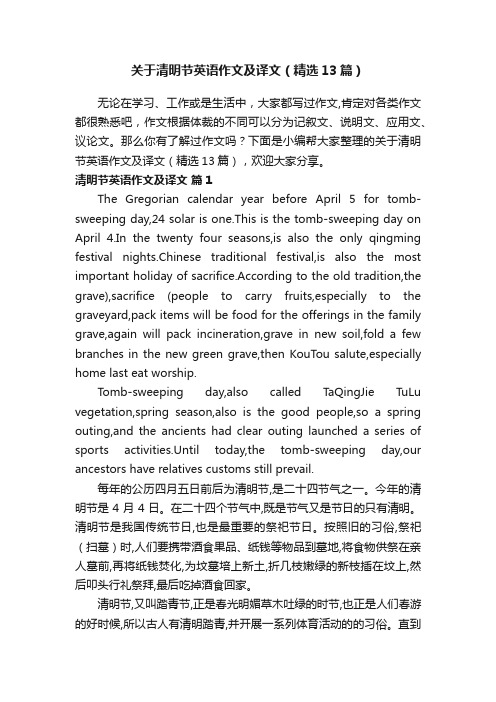
关于清明节英语作文及译文(精选13篇)无论在学习、工作或是生活中,大家都写过作文,肯定对各类作文都很熟悉吧,作文根据体裁的不同可以分为记叙文、说明文、应用文、议论文。
那么你有了解过作文吗?下面是小编帮大家整理的关于清明节英语作文及译文(精选13篇),欢迎大家分享。
清明节英语作文及译文篇1The Gregorian calendar year before April 5 for tomb-sweeping day,24 solar is one.This is the tomb-sweeping day on April 4.In the twenty four seasons,is also the only qingming festival nights.Chinese traditional festival,is also the most important holiday of sacrifice.According to the old tradition,the grave),sacrifice (people to carry fruits,especially to the graveyard,pack items will be food for the offerings in the family grave,again will pack incineration,grave in new soil,fold a few branches in the new green grave,then KouT ou salute,especially home last eat worship.Tomb-sweeping day,also called TaQingJie TuLu vegetation,spring season,also is the good people,so a spring outing,and the ancients had clear outing launched a series of sports activities.Until today,the tomb-sweeping day,our ancestors have relatives customs still prevail.每年的公历四月五日前后为清明节,是二十四节气之一。
清明节英语资料

清明节英语资料篇一:清明节英文介绍清明节英文介绍A well-known poem by Tang Dynasty writer Du Mu tells of a sad scene in early April: "rains fall heavily as Qingming comes, and passers-by with lowered spirits go." Qingming Day, the traditional tomb-sweeping day, falls on April 4-6 each year. It is a time for remembering loved ones who have departed. People visit their ancestors' graves to sweep away the dirt.唐朝著名诗人杜牧有一首著名的诗,描述了四月初令人伤感的一幕场景:“清明时节雨纷纷,路上行人欲断魂。
”每年4月4-6日左右的清明节是传统的扫墓的日子。
在这一天,人们祭吊去世的亲人,到先人的坟头上扫墓。
Its origin dates back to the Spring and Autumn Period. Jin prince Chong'er ran away from the country with his supporters due topersecution. They were homeless for 19 years and things got so bad that Chong'er began to starve to death. One of the prince's faithful followers, Jie Zitui, cut a piece of muscle from his own leg and served it to hismaster. Chong'er was saved and, in 636 BC, he tookback the throne. 清明节可以追溯到春秋时代。
介绍清明节的英语作文有翻译
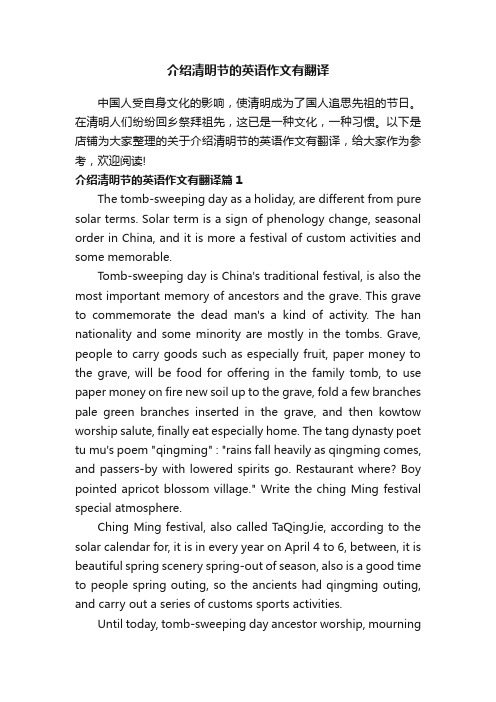
介绍清明节的英语作文有翻译中国人受自身文化的影响,使清明成为了国人追思先祖的节日。
在清明人们纷纷回乡祭拜祖先,这已是一种文化,一种习惯。
以下是店铺为大家整理的关于介绍清明节的英语作文有翻译,给大家作为参考,欢迎阅读!介绍清明节的英语作文有翻译篇1The tomb-sweeping day as a holiday, are different from pure solar terms. Solar term is a sign of phenology change, seasonal order in China, and it is more a festival of custom activities and some memorable.Tomb-sweeping day is China's traditional festival, is also the most important memory of ancestors and the grave. This grave to commemorate the dead man's a kind of activity. The han nationality and some minority are mostly in the tombs. Grave, people to carry goods such as especially fruit, paper money to the grave, will be food for offering in the family tomb, to use paper money on fire new soil up to the grave, fold a few branches pale green branches inserted in the grave, and then kowtow worship salute, finally eat especially home. The tang dynasty poet tu mu's poem "qingming" : "rains fall heavily as qingming comes, and passers-by with lowered spirits go. Restaurant where? Boy pointed apricot blossom village." Write the ching Ming festival special atmosphere.Ching Ming festival, also called TaQingJie, according to the solar calendar for, it is in every year on April 4 to 6, between, it is beautiful spring scenery spring-out of season, also is a good time to people spring outing, so the ancients had qingming outing, and carry out a series of customs sports activities.Until today, tomb-sweeping day ancestor worship, mourningthe late relatives customs still prevail.清明作为节日,与纯粹的节气有所不同。
杜牧《清明》译文
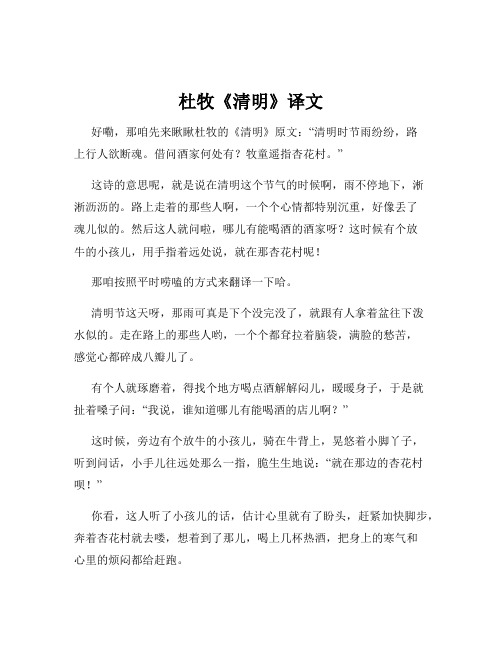
杜牧《清明》译文
好嘞,那咱先来瞅瞅杜牧的《清明》原文:“清明时节雨纷纷,路
上行人欲断魂。
借问酒家何处有?牧童遥指杏花村。
”
这诗的意思呢,就是说在清明这个节气的时候啊,雨不停地下,淅
淅沥沥的。
路上走着的那些人啊,一个个心情都特别沉重,好像丢了
魂儿似的。
然后这人就问啦,哪儿有能喝酒的酒家呀?这时候有个放
牛的小孩儿,用手指着远处说,就在那杏花村呢!
那咱按照平时唠嗑的方式来翻译一下哈。
清明节这天呀,那雨可真是下个没完没了,就跟有人拿着盆往下泼
水似的。
走在路上的那些人哟,一个个都耷拉着脑袋,满脸的愁苦,
感觉心都碎成八瓣儿了。
有个人就琢磨着,得找个地方喝点酒解解闷儿,暖暖身子,于是就
扯着嗓子问:“我说,谁知道哪儿有能喝酒的店儿啊?”
这时候,旁边有个放牛的小孩儿,骑在牛背上,晃悠着小脚丫子,
听到问话,小手儿往远处那么一指,脆生生地说:“就在那边的杏花村呗!”
你看,这人听了小孩儿的话,估计心里就有了盼头,赶紧加快脚步,奔着杏花村就去喽,想着到了那儿,喝上几杯热酒,把身上的寒气和
心里的烦闷都给赶跑。
这首诗是杜牧写的,杜牧那可是唐朝的大诗人,他的诗好多都特别有名。
这首《清明》呢,把清明时候的那种氛围,还有人的心情都写得活灵活现的。
咱们现在读起来,都能感觉到那雨,那愁闷的人,还有那可爱的小牧童。
咋样,我这翻译够地道不?是不是就跟咱平时唠嗑一样?。
- 1、下载文档前请自行甄别文档内容的完整性,平台不提供额外的编辑、内容补充、找答案等附加服务。
- 2、"仅部分预览"的文档,不可在线预览部分如存在完整性等问题,可反馈申请退款(可完整预览的文档不适用该条件!)。
- 3、如文档侵犯您的权益,请联系客服反馈,我们会尽快为您处理(人工客服工作时间:9:00-18:30)。
All souls’ day(外国的万灵节)
All souls’ festive day The qingming festival
In the rainy season of spring
《清明》·杜牧
译文一: The mourning day
A drizzling rain falls like tears on the mourning day ;
语法方面
• 诗法(Poetic grammar)规则。例:第二人称代 词用ye 和thou,动词第三人称单数加(e)st或 (e)th。 • 省略:把诗句中次要的成分删略, 只保留主要的 成分。 • 倒装:是诗歌语言的一大特色,目的主要在于把最 重要的词放在诗中最突出的位置上加以强调。 • 跨行:英诗不论句而论行。当一行诗在句法和诗 意上不完整的时候, 就把剩余部分移到下行, 这 就叫跨行。
It drizzles thick and fast on the pure brightness day;
I travel with my heart lost in dismay .
“is there a public house somewhere, cowboy?” He points at apricot bloom village faraway.
《清明》·杜牧(为例说明翻译中选词的问题)
清明时节雨纷纷,路上行人欲断魂。 借问酒家何处在,牧童遥指杏花村。
标题的翻译 英译文例举有一下几种: The pure brightness day The day of mourning for the dead The mourning day
英语诗歌语言特点
语音
•头韵( Alliteration ) ,就是在一个词组或一个诗 行中, 有两个以上彼此靠近的词, 其开头的音节( 或 其它重读音节)具有同样的字母或声音。 例:The fair breeze blew,the white foam flew (古英语诗中没有脚韵,当时全靠头韵。) •谐音( Euphony ) 是根据语句或语段的内容,选择 最适当的语音结构。 以造成最强烈的感情效果。 例:It's the hour when from the boughs,the nightingale's high note is beard.
• 半谐音(Assonance )是指在一段语言里重复某些 相同或相似的元音(一般都在重读音节) , 形成 元音押韵, 辅音则不押韵。 例:Rise like lions after slumber In unvanquishable number -Shake your chains to earth like dew • 拟声(Onomatopoeia)
词汇方面
• ቤተ መጻሕፍቲ ባይዱ体词
例: discomfit=defeat,even=evening,hath=has,mee=me,nath eless=nevertheless,wilt=will等。
• 诗体词 例:
brand=sword,couch=bed,fair=beauty,ire=anger,main=s ea,steed=horse 诗体短语:feathered race=birds,watery store=sea
The mourner’s heart is going to break on his way. Where can a wineshop be found to drown his sad hours?
A cowherd points to a cot’mid apricot flowers.
译文二: The pure brightness day
英语诗歌风格
• 玄理:语言形象、生动,多用文雅的词藻以及典故 和比喻。 • 新古典主义:语言清晰、直接、贴切, 使用词语 不晦涩、难解, 使用成语较多。 • 浪漫主义:使用的词语绚丽多彩、明白易懂, 着 重描写景色和情感, 想象力较为丰富。 • 和象征主义:所用的词语在于引起心理上和精神 上的激动; 同时, 常用神话和黔司传说, 运用象 征手法, 用词精炼准确, 形象生动优美。
• 外来词
例: amicable=friendly,commence=bigen,maison=house,visa ge=face等
英诗语言的根本特点是保守性和守旧性的对立面, 即自由性和创新。这主要表现为破格和变异。
•破格:在词汇方面主要表现为一些特殊的缩略形式, 例: e'en=even,'mong=among,ne'er=never,o'er=over,thr o=through,'tis=it is,t'was=it was等 •变异:在词汇方面主要表现为创造新词。例: the widow-makingunchilding unfathering deeps(=the sea),若用常规语言,则该是:the deeps(the sea),which deprive(wifes)of husbands,(children) of fathers and (parents )of children .
